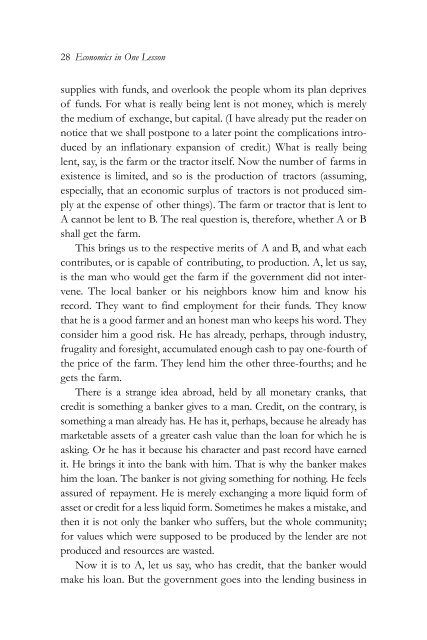1gDdM7w
1gDdM7w
1gDdM7w
- No tags were found...
You also want an ePaper? Increase the reach of your titles
YUMPU automatically turns print PDFs into web optimized ePapers that Google loves.
28 Economics in One Lessonsupplies with funds, and overlook the people whom its plan deprivesof funds. For what is really being lent is not money, which is merelythe medium of exchange, but capital. (I have already put the reader onnotice that we shall postpone to a later point the complications introducedby an inflationary expansion of credit.) What is really beinglent, say, is the farm or the tractor itself. Now the number of farms inexistence is limited, and so is the production of tractors (assuming,especially, that an economic surplus of tractors is not produced simplyat the expense of other things). The farm or tractor that is lent toA cannot be lent to B. The real question is, therefore, whether A or Bshall get the farm.This brings us to the respective merits of A and B, and what eachcontributes, or is capable of contributing, to production. A, let us say,is the man who would get the farm if the government did not intervene.The local banker or his neighbors know him and know hisrecord. They want to find employment for their funds. They knowthat he is a good farmer and an honest man who keeps his word. Theyconsider him a good risk. He has already, perhaps, through industry,frugality and foresight, accumulated enough cash to pay one-fourth ofthe price of the farm. They lend him the other three-fourths; and hegets the farm.There is a strange idea abroad, held by all monetary cranks, thatcredit is something a banker gives to a man. Credit, on the contrary, issomething a man already has. He has it, perhaps, because he already hasmarketable assets of a greater cash value than the loan for which he isasking. Or he has it because his character and past record have earnedit. He brings it into the bank with him. That is why the banker makeshim the loan. The banker is not giving something for nothing. He feelsassured of repayment. He is merely exchanging a more liquid form ofasset or credit for a less liquid form. Sometimes he makes a mistake, andthen it is not only the banker who suffers, but the whole community;for values which were supposed to be produced by the lender are notproduced and resources are wasted.Now it is to A, let us say, who has credit, that the banker wouldmake his loan. But the government goes into the lending business in


